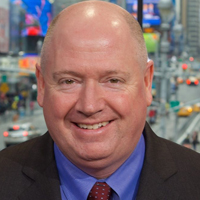
With Major Studios Cooling On Syndication, Stations Seek Program Alternatives
In the pre-pandemic times of 2019, two well-known names launched talk shows in daytime syndication: pop star Kelly Clarkson and news maven Tamron Hall. One year later, in pandemic-deep September 2020, movie star Drew Barrymore debuted her own talker. And last year, Warner Bros. brought EGOT winner Jennifer Hudson to TV stations, while Debmar-Mercury premiered former co-host of The View Sherri Shepherd.
This fall, there are eight strips premiering in syndication, but it feels like there’s nothing new out there because none of these offerings come with a movie-star name in the title or a robust marketing campaign behind it. Instead of attention-grabbing launches, low-cost repeats have begun to prevail across TV-station schedules.
Moreover, many of syndication’s biggest producers — and particularly Warner Bros. Discovery and Paramount/CBS — have pulled back on syndication in the past year, with several major shows bowing out.
In February, Warner Bros. Discovery canceled its two long-running court shows — People’s Court and Judge Mathis — and saw Mike Darnell, president, unscripted and alternative television at Warner Bros., and David McGuire, EVP of programming and development at Warner Bros.’ Telepictures, both exit the company. That left Warner Bros. Discovery, which previously produced such syndicated hits as Rosie O’Donnell and Ellen DeGeneres, with only two shows left in first-run production: Jennifer Hudson and Extra.
Similarly, CBS Media Ventures, which has been the top provider of syndicated shows to TV stations for decades, has seen many of its major shows conclude: Judge Judy, which was the top-rated show in daytime by a long shot, went out of original production in 2021 while Dr. Phil, which was the No. 1 or 2 rated talk show throughout its 21-season run, and Rachael Ray both ended this year. And in August, Steven LoCascio, president of CBS Media Ventures, retired, with Wendy McMahon named president and chief executive officer of CBS News and Stations and CBS Media Ventures, assuming LoCascio’s duties.
Finally, Disney CEO Bob Iger signaled earlier this summer that Disney is looking to exit the linear TV business. Disney/ABC hasn’t produced a new first-run syndicated show since it launched Tamron Hall in 2019. The company’s only other first-run syndicated offering is Live with Kelly and Mark, and that show has been running largely on its own steam since it entered national syndication in 1988.

Byron Allen
“At the end of the day, broadcast TV stations are in big trouble,” says Byron Allen, chairman and CEO of Allen Media Group. “The suppliers on whom they have depended for content for decades have abandoned them. They are taking their capital, their resources and their content and they are putting it on streaming platforms to go directly to consumers.”
What this seismic shift in the syndication business is forcing stations to realize is that while they’ve kicked around the idea for years, they may finally have no choice but to produce their own programming. And news cannot fill every empty space on a station’s schedule.
“Stations cannot keep adding more and more news because they are going to trigger news fatigue and significant diminishment of returns,” Allen says.
That said, new content is coming to TV stations this fall. There are three new game shows: Debmar-Mercury’s People Puzzler, which comes off of GSN and is hosted by Leah Remini; Fox’s Person Place or Thing, hosted by Reba’s Melissa Peterman; and TMZ’s Who the Bleep Is That?, which Fox tested in several markets earlier this year. All of those shows will join game blocks on Fox stations across the country; going away is You Bet Your Life with Jay Leno, which Fox couldn’t keep in production once the writers strike started.
There are four new court shows. Three come from Allen Media Group: Justice for the People with Judge Milian, Mathis Court with Judge Mathis and Equal Justice with Judge Eboni K. Williams. Allen signed People’s Court’s Judge Marilyn Milian and Judge Mathis’ Judge Greg Mathis after Warner Bros. canceled their shows. AMG bundles its court shows together in blocks on TV stations and cumes the advertising revenue across those blocks.
Allen says his company is now the biggest provider of first-run programming to TV stations: “TV stations got ghosted by the studios. They got new girlfriends and [stations] didn’t even get a text.”
A new entry to syndication, Crazy Legs Production, has Cutlers Court. The show is hosted by married judges Keith and Dana Cutler who previously starred on MGM’s Couples Court with the Cutlers, which is no longer in production. Finally, CBS is taking a note from NBC and bringing a repackaged and true-crime-focused version of news magazine 48 Hours to TV stations.
All of these shows have a few things in common. They are sold on an all-barter basis, meaning that no cash changes hands. They can be produced in batches, making them much cheaper than a talk show, for example, which needs to be produced on an almost-daily basis. And in the case of 48 Hours, producers have some 600 episodes from which to draw.
But these shows on their own are not enough to fill all of the time periods that TV stations have available. That’s why repeats have begun to prevail across the syndicated landscape, with such shows as Judge Judy, Maury, Jerry Springer, Judge Jerry and more filling empty slots. CBS Media Ventures also hopes to bring repeats of Dr. Phil to TV stations, although non-conflict talk historically does not repeat well. While programming repeats makes economic sense, it’s nearly impossible to build viewership with them.

Stephen Brown
“[I]f you start programming repeats into your schedule, you are just adding to the doom spiral,” says Stephen Brown, EVP, programming, Fox Television Stations and Fox First Run.
While Fox airs repeats of such shows as Judge Judy, People’s Court and Judge Mathis in some markets, the station group tries to avoid it if it can. But sometimes choices are limited.
To combat the lure of cheap and easy reruns, stations are turning inward. Fox has been doing this for years, producing shows on its own such as Divorce Court and Dish Nation, and in partnership with others, such as Pictionary with CBS. Fox also acquired TMZ in September 2021, with programs TMZ, TMZ Live, primetime specials and now Who the Bleep is That?
“We’ve figured out how to produce programs in a cost-effective way that allows us to still air originals and that gets people to stay with us for the shows,” Brown says. “We reward viewers with play-at-home games and behind-the-scenes footage. We’re really doubling down on the effort to keep the dwindling audience. There are still loyal linear viewers and those are the people we need to pay attention to and reward. If you’re producing a $40 million talk show that’s a tough row to hoe. I don’t know how you make up that money.”
Sinclair has a development deal with CSI creator Anthony Zuiker that is expected to yield new shows next fall — and potentially, primetime shows down the road
This phenomenon of stations turning into programmers is not new — TV stations have been producing their own shows since TV began. Some of daytime’s most successful shows, such as The Oprah Winfrey Show and Live with Regis and Kathie Lee (now Live with Kelly and Mark) were first produced at the local level and then taken national. That said, station groups tend to resist buying programming from other groups.
There are exceptions, although recent examples have not had the success of an Oprah or a Live. Tegna’s Daily Blast Live has been airing since 2017. It can be found on stations in approximately 80 markets as well as on YouTube and streaming live on Tegna station apps and on its website, dailyblastlive.com. But Daily Blast Live airs mostly on Tegna-owned stations and platforms and hasn’t been able to gain national clearance.
Another show, viral video series Right This Minute, was created and produced by a coalition of station groups: Cox, Gray and E.W. Scripps in collaboration with Magic Dust Television. It aired from 2011 until 2022 and found national distribution during that 11-year run.
Fox has been working on a model of clearing shows regionally. For example, KMSP Minneapolis’ The Jason Show works well in that market, but it did not perform when Fox tried it in a larger test in 2016. Since then, Fox has begun airing the show in markets beyond Minneapolis, including Chicago, Seattle, Orlando and Sioux Falls, S.D. It’s a model the group would like to draw from when appropriate.

Frank Cicha
“We’ve always started with the idea that the goal wasn’t national syndication. The goal was a show that worked in one’s own market and if it went anywhere else, terrific,” says Frank Cicha, EVP, programming, Fox Television Stations. “We’ve been using some creative ways to fill holes around the group that I think are going to lead to innovation.”
Station groups are still willing to pay cash license fees for shows that they deem worth it — it’s just that there are far less of those being produced.
“The station groups realize that some people are going to need money in order to produce programming,” Cicha says. “It’s not always about getting the best deals you can get. If you have a show and you want it to continue, you are going to have to pay. I would rather be paying for Sherri Shepherd and Jennifer Hudson than not right now.”

Ira Bernstein
And many still remain bullish on the local TV station business: “Local TV stations are still incredibly profitable,” says Ira Bernstein, co-president of Debmar-Mercury. “The two things that they are going to continue to do that make them unique are local news and first-run syndication. Those are things that you don’t see in other places.”
Making sure that stations can continue to offer that unique programming at an affordable price is the problem that the industry is looking to solve.

Scott Ehrlich
“I’m quoting John Cleese when I say the most creative solutions come from letting yourself be uncomfortable for longer,” says Scott Ehrlich, Sinclair’s chief innovation officer.
“Everyone wants to have the solution by the end of the sentence,”he adds. “I’m uncomfortable with this problem, but I’m prepared to live with the discomfort until we find more creative answers.”
































Comments (2)
newser says:
August 23, 2023 at 11:26 am
It’s more valuable per local affiliate to just produce their own newscast to fill airtime and do volume sales on local ads.
[email protected] says:
August 24, 2023 at 12:46 am
I thought You Bet Your Life would air repeats until the writers strike was over. I watched it from time to time it was a good show. Daily Blast Live isn’t a very good show surprised that it has lasted this long Truth be told DBL comes on at 7:30PM which isn’t live By the way when it is aired on WZZM DBL replaced The Insider 2017. TEGNA also aired Sister Circle first season was a half at 10AM in 2017 was surprised that it aired in West Michigan went an hour 10AM to 11AM as Page Six TV moved to WXSP in it’s final year. Sister Circle ended during COVID which was a flop that was only on a handful of TEGNA stations, unlike DBL.
I think a lot of these type of shows like DBL & The List that was only on Scripps stations across the country just aren’t national type shows and are filler and cheap to make that make little truth be told. The List didn’t debut until Jan of 2021 on the weekend and went daily in the fall of 21 until the end of June of this year on Fox17.